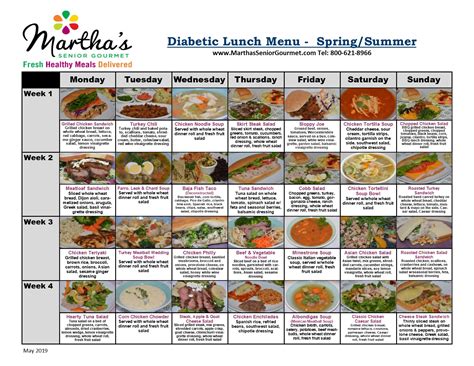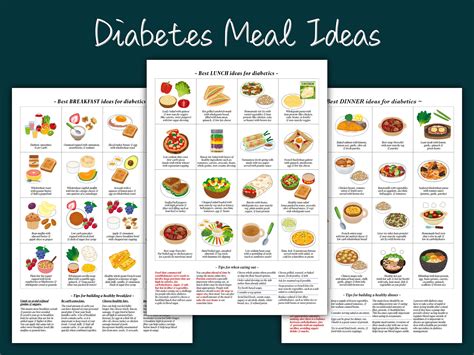Intro
Living with diabetes requires a careful balance of lifestyle adjustments, including diet, exercise, and medication. One of the most critical aspects of managing diabetes is meal planning. A well-planned diabetes meal can help regulate blood sugar levels, maintain a healthy weight, and prevent complications. In this article, we will delve into the world of diabetes meal planning, exploring the importance of a balanced diet, and providing 7 valuable tips to help individuals with diabetes make informed food choices.
Diabetes is a chronic condition that affects millions of people worldwide. It is characterized by high blood sugar levels, which can be managed through a combination of medication, lifestyle changes, and dietary adjustments. A healthy diet plays a vital role in diabetes management, as it helps regulate blood sugar levels, improves overall health, and reduces the risk of complications. With so many food options available, it can be overwhelming to determine what to eat and what to avoid. However, with the right guidance, individuals with diabetes can create a personalized meal plan that meets their unique needs and promotes optimal health.
The importance of a balanced diet cannot be overstated. A well-planned meal provides the body with the necessary nutrients, vitamins, and minerals to function properly. For individuals with diabetes, a balanced diet helps regulate blood sugar levels, maintains a healthy weight, and reduces the risk of complications such as heart disease, kidney damage, and nerve damage. A diabetes meal plan should include a variety of foods from all food groups, including fruits, vegetables, whole grains, lean proteins, and healthy fats. By making informed food choices, individuals with diabetes can take control of their condition and improve their overall quality of life.
Understanding Diabetes Meal Planning

Diabetes meal planning involves creating a personalized eating plan that takes into account an individual's lifestyle, preferences, and nutritional needs. A diabetes meal plan should be tailored to an individual's specific needs, including their blood sugar goals, medication regimen, and any dietary restrictions. The plan should also be flexible, allowing for adjustments as needed. A registered dietitian or a healthcare provider can help individuals with diabetes create a personalized meal plan that meets their unique needs and promotes optimal health.
Benefits of a Balanced Diet
A balanced diet provides numerous benefits for individuals with diabetes. Some of the benefits include: * Regulating blood sugar levels * Maintaining a healthy weight * Reducing the risk of complications such as heart disease, kidney damage, and nerve damage * Improving overall health and well-being * Increasing energy levels and reducing fatigue * Supporting healthy weight loss and maintenance7 Tips for Diabetes Meal Planning

Here are 7 valuable tips to help individuals with diabetes create a personalized meal plan:
- Eat regular meals: Eating regular meals helps regulate blood sugar levels and prevents extreme highs and lows. Aim for three main meals and one or two snacks per day.
- Choose whole foods: Whole foods such as fruits, vegetables, whole grains, lean proteins, and healthy fats provide essential nutrients and fiber. Aim to include a variety of whole foods in your meal plan.
- Include protein at every meal: Protein helps regulate blood sugar levels and provides a feeling of fullness and satisfaction. Include a source of protein at every meal, such as lean meats, fish, eggs, tofu, or legumes.
- Watch carbohydrate intake: Carbohydrates have a significant impact on blood sugar levels. Monitor carbohydrate intake and choose complex carbohydrates such as whole grains, fruits, and vegetables.
- Stay hydrated: Staying hydrated is essential for overall health and can help regulate blood sugar levels. Aim to drink at least eight glasses of water per day.
- Limit added sugars: Added sugars can cause a spike in blood sugar levels and provide empty calories. Limit added sugars and choose natural sources of sugar such as fruits and vegetables.
- Be mindful of portion sizes: Portion sizes can have a significant impact on blood sugar levels and weight management. Use a food scale or measuring cups to measure portion sizes and control the amount of food consumed.
Creating a Personalized Meal Plan
Creating a personalized meal plan involves taking into account an individual's lifestyle, preferences, and nutritional needs. Here are some steps to follow: * Consult with a registered dietitian or healthcare provider to determine nutritional needs and create a personalized meal plan. * Keep a food diary to track eating habits and identify patterns and areas for improvement. * Plan meals in advance to ensure healthy food choices and prevent last-minute decisions. * Shop for healthy foods and avoid processed and packaged foods. * Cook at home using healthy cooking methods such as grilling, roasting, and steaming.Common Diabetes Meal Planning Mistakes

Here are some common mistakes to avoid when creating a diabetes meal plan:
- Not eating regularly: Skipping meals can cause extreme highs and lows in blood sugar levels.
- Not monitoring carbohydrate intake: Failing to monitor carbohydrate intake can lead to uncontrolled blood sugar levels.
- Not staying hydrated: Dehydration can cause a range of health problems, including fatigue, headaches, and dizziness.
- Not being mindful of portion sizes: Overeating can lead to weight gain and uncontrolled blood sugar levels.
- Not seeking professional guidance: Failing to seek professional guidance can lead to confusion and frustration when creating a diabetes meal plan.
Diabetes Meal Planning Resources
Here are some valuable resources to help individuals with diabetes create a personalized meal plan: * **American Diabetes Association**: The American Diabetes Association provides a range of resources, including meal planning guides, recipes, and nutrition advice. * **Academy of Nutrition and Dietetics**: The Academy of Nutrition and Dietetics provides evidence-based nutrition advice and meal planning resources for individuals with diabetes. * **Registered dietitians**: Registered dietitians can provide personalized nutrition advice and meal planning guidance for individuals with diabetes.Conclusion and Next Steps

Creating a personalized diabetes meal plan requires careful consideration of nutritional needs, lifestyle, and preferences. By following the 7 tips outlined in this article, individuals with diabetes can take control of their condition and improve their overall quality of life. Remember to seek professional guidance, stay hydrated, and be mindful of portion sizes. With the right guidance and support, individuals with diabetes can create a personalized meal plan that promotes optimal health and well-being.
We invite you to share your thoughts and experiences with diabetes meal planning in the comments section below. What tips and strategies have you found most helpful in managing your condition? What challenges have you faced, and how have you overcome them? By sharing your story, you can help others who are navigating the complex world of diabetes meal planning.
What is the best way to manage blood sugar levels through diet?
+The best way to manage blood sugar levels through diet is to eat regular meals, choose whole foods, and monitor carbohydrate intake. It is also essential to stay hydrated and be mindful of portion sizes.
How often should I consult with a registered dietitian or healthcare provider?
+It is recommended to consult with a registered dietitian or healthcare provider at least once a year to review and update your diabetes meal plan. However, if you experience any changes in your condition or have concerns, it is essential to seek guidance more frequently.
What are some healthy snack options for individuals with diabetes?
+Healthy snack options for individuals with diabetes include fruits, vegetables, nuts, seeds, and whole grain crackers. It is essential to choose snacks that are low in added sugars, salt, and unhealthy fats.
